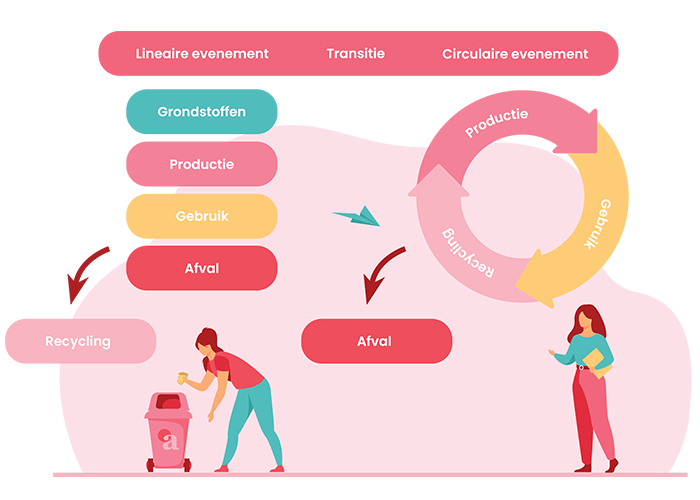Automatic translations now available in the Event Website Builder
Discover how the Event Website Builder is now more user-friendly with direct integration through our API connection. Automatic translations in a...

Sustainability and circularity are terms that are gaining more attention in the events industry, and rightfully so. Making events more sustainable is essential to contribute positively to the environment, society, and the future.
In this article, we explore the path to organizing a sustainable and circular event. We discuss why making your event more sustainable is so important, despite the potential challenges it may bring. Additionally, we delve into what sustainability and circularity truly mean within the context of the events industry.
Moreover, we share practical tips and tools you can use to organize your event in a sustainable and circular way. From choosing a sustainable venue to minimizing waste and promoting sustainable transport, these tips will help you make conscious choices and create a positive impact.
Handy: download our infographic and save the tips directly to your computer.
Why is making your event more sustainable essential?
Making your event more sustainable brings numerous benefits and has a positive impact on both the environment and your reputation. By consciously choosing sustainable practices, such as minimizing negative environmental impact and promoting social responsibility, you demonstrate that, as an organizer, you are committed to a sustainable future. Let’s be honest—sustainability is no longer an optional extra but a necessity in this era of growing environmental challenges and societal awareness. Making your event more sustainable is essential because it can make a difference and drive positive change.
While organizing a sustainable event may come with challenges, such as potential additional costs and extra effort, the positive effects far outweigh the drawbacks. Sustainable events have a stronger appeal to participants and stakeholders who value sustainability and corporate social responsibility. It’s an opportunity to stand out as a responsible and engaged organizer contributing to a more sustainable world.
In short, making your event more sustainable is not only a responsible choice but also offers countless benefits for both the environment and your reputation. By investing in sustainable methods, you create a positive impact and position your event as a model of sustainability and responsibility.
What does organizing sustainable events mean?
Organizing sustainable events goes beyond just planning and executing an event. It’s an active approach that considers social, ecological, and economic aspects to create a positive impact. It means finding a balance between meeting present needs and preserving opportunities for future generations.
Sustainable events focus on minimizing negative environmental impact while maximizing positive effects on both the environment and society. This includes reducing energy consumption, minimizing waste, and promoting sustainable transportation.
As the organizer of a sustainable event, you take responsibility for reducing the ecological footprint and promoting sustainable development. This can be achieved by using renewable energy sources, selecting sustainable suppliers, and implementing eco-friendly practices during the event.
An inspiring example of sustainability in the events world is the first climate-neutral match in professional football, featuring FC Dordrecht and TOP Oss. This groundbreaking event demonstrated that football and sustainability can go hand in hand. Despite the organizational challenges, the focus was on sustainability and behavioral change among all participants. A beautiful and inspiring example for other clubs in professional football.
What does organizing circular events mean?
Organizing circular events is an active approach aimed at minimizing waste and maximizing reuse. It’s about creating a closed-loop system where resources, materials, and products are reused as much as possible, preserving their value.
Circular events focus on reducing waste and promoting sustainable consumption. This means implementing strategies as an organizer to minimize waste, such as separating different waste streams and encouraging reuse and recycling. Additionally, it’s important to use sustainable materials and products that can be repaired, upgraded, reused, or recycled.
Consider using Event Management software to digitize your financial administration and transform your current processes! Say goodbye to the hassle of financial paperwork. Not only does this often save paper in practice—since you’ll only receive two digital final invoices after all ticket sales—but it also takes a lot of work off your hands. With the handy financial administration add-on, all tasks are handled effortlessly and efficiently.
Organizing a circular event also involves thinking consciously about the lifecycle of the materials and products used. This includes selecting suppliers who provide sustainable and recyclable products and designing event spaces that are flexible and adaptable for multiple uses.
Circular event organization is a powerful approach to reducing waste and promoting sustainable consumption. It aims to preserve value and close the loop, ensuring resources and materials are reused instead of discarded. By applying circular principles, you, as an organizer, can contribute to a sustainable and resilient future.

Make a positive impact and organize your sustainable and circular event today! Download the infographic now for practical tips and tools.
Tips to make your event more sustainable
Here are some active and practical tips to organize your event in a more sustainable way:
By applying these tips, you can make your event more sustainable and have a positive impact on the environment and society. Organizing a sustainable event is a challenge, but the benefits and contribution to a more sustainable future far outweigh the effort.
Download our informative and inspiring infographic to get started with organizing a sustainable and circular event! This visually appealing guide contains practical tips and tools to help you make conscious choices and leave a positive impact.
Download the infographic below and become a pioneer in sustainable event organization. Together, we can make a difference and contribute to a more sustainable future!
Curious about how we aim to minimize and offset our CO2 emissions?
In addition to offering innovative solutions like Event Check-In and Event Management to reduce paper waste during events, aanmelder.nl is also focused on minimizing and offsetting its own CO2 emissions.
We actively strive to reduce and offset our CO2 emissions. In our commitment to contributing to climate neutrality, we believe that companies should take the lead in working and living sustainably. That’s why we are actively working to lower our own emissions and offset the remaining ones, both from ourselves and our suppliers. For example, CO2 emissions are offset through donations to projects by FairClimateFund.
Do you have other tips you'd like to share with peers for making events more sustainable? Send a message to info@aanmelder.nl. We greatly appreciate additional suggestions and tips!
Want a smooth and professional welcome at your event? Capture your guests' attention instantly with seamless registration and personalized badges. Save time and impress your attendees. Click now to learn more about this flexible and eco-friendly solution.
Discover how the Event Website Builder is now more user-friendly with direct integration through our API connection. Automatic translations in a...
Star your favorite events to keep them at the top of your list, no matter how you sort. Stay organized and boost your efficiency!
In this article we'll explain how you can create your own registration form or sign up sheet.